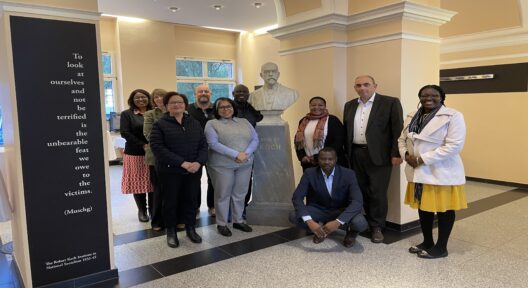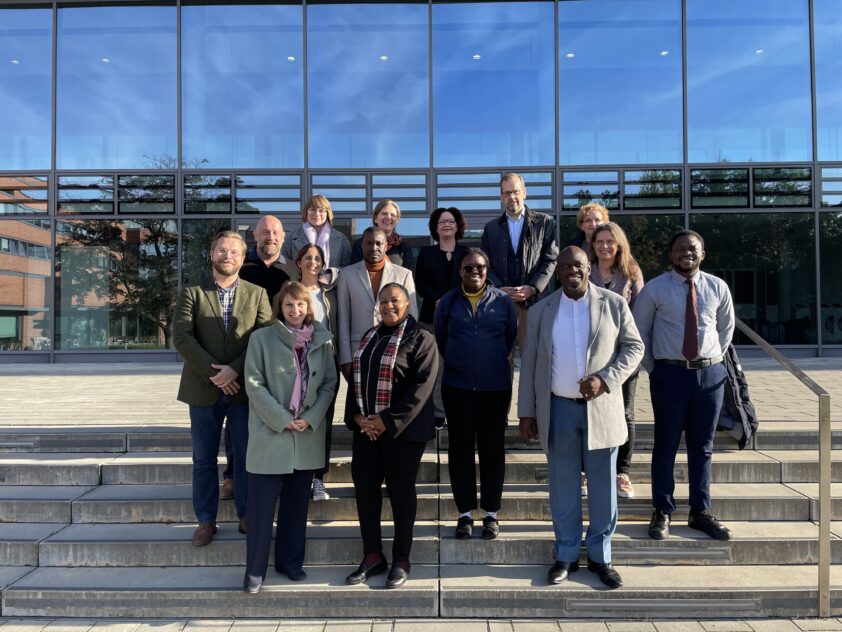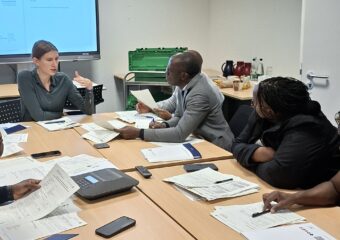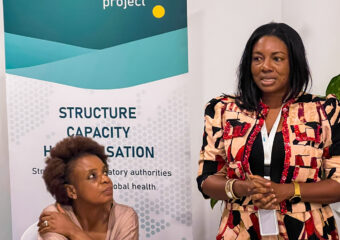Namibian Delegation Attends World Health Summit and Meets with Partners in Berlin
A delegation from the Namibian Ministry of Health & Social Services came to Berlin to establish contacts and networks, exchange experiences and learn more about national public health institutes such as the Robert Koch Institute.

The visit of the Namibian delegation in autumn 2023 aimed at further consolidating and strengthening the partnership between the Namibian Ministry of Health & Social Services (MoHSS) and the Robert Koch Institute (RKI). The five-member delegation from Namibia was led by Deputy Minister Dr Esther Muinjangue and Deputy Executive Director Petronella Masabane.
The Namibian MoHSS and RKI have maintained a close and trusting cooperation since the successful start of the Namibia-RKI Twinning Project (TwiNit, TwiNit 2.0) in 2020. The project is part of the Global Health Protection Programme (GHPP) and its long-term goal is to build and found the Namibia Public Health Institute (NamPHI).
From 15 to 17 October, the delegates attended the World Health Summit (WHS) in Berlin. They engaged in discussions with globally active representatives from politics and the healthcare sector. In addition, they built new relationships that might provide valuable support in the process of establishing the NamPHI.
The delegates also contributed to a high-level side meeting at the WHS entitled “Strengthening National Public Health Institutes: Scopes and Struggles”. It was organised by the Centre for International Health Protection (Zentrum für Internationalen Gesundheitsschutz; ZIG), unit ZIG 1. National public health institutes (NPHIs) play a vital role in maintaining national and global public health. Therefore, many countries plan to establish or strengthen such institutes supported by their peers as well as supranational organisations and networks. The panel discussed how the “NPHI agenda” could be effectively implemented and how this endeavour could benefit from evidence, exchange, peer learning and coordinated cooperation. NamPHI provided a real-life example that illustrated the challenging process of establishing an NPHI for a single country.

When visiting the RKI, the TwiNit 2.0 team and delegates exchanged ideas for specific project activities of the six work packages. A discussion held subsequently helped to elaborate on further important details such as the integration of these activities to strengthen the core public health functions for the future NamPHI. The delegation visited the Public Health Emergency Operations Centre (PHEOC) of the RKI coordinated by unit 31. Here, they got familiar with its structure and mandate as well as lessons learnt during the COVID-19 pandemic. Unit ZIG 4 gave the delegation a tour through the training laboratory and briefed them on the set-up including the molecular laboratory workflows and the establishment of ready-to-deploy mobile laboratories.
During their stay, the delegation visited the Charité – Universitätsmedizin and the WHO Hub for Pandemic and Epidemic Intelligence, where they discussed health topics and ideas for future collaboration.
The visit to Berlin offered the Namibian delegation the opportunity to build contacts and network, exchange experiences and learn more about national public health institutes such as the RKI. Moreover, the partnership between the Namibian MoHSS and the RKI was further strengthened. The partners could re-emphasise the importance of working together towards establishing an NPHI in Namibia.




